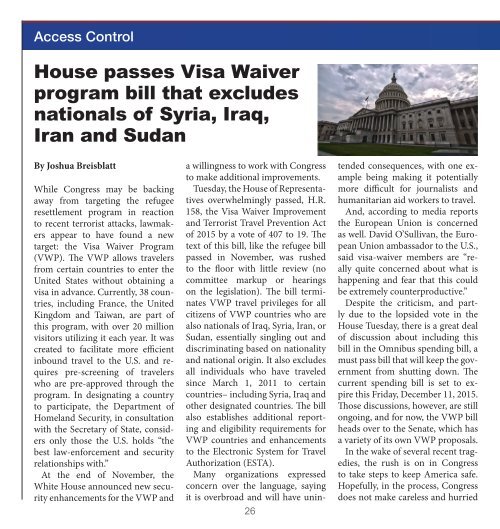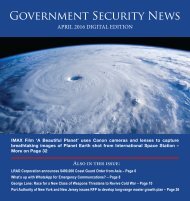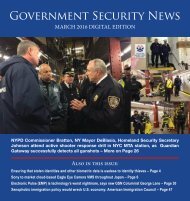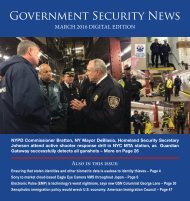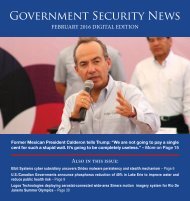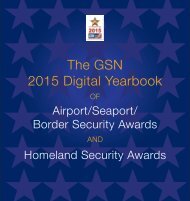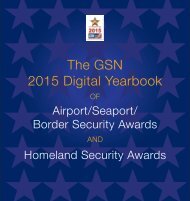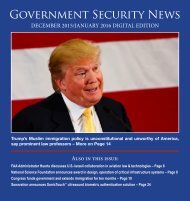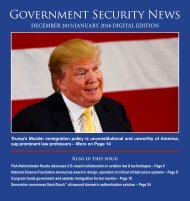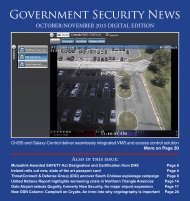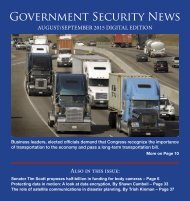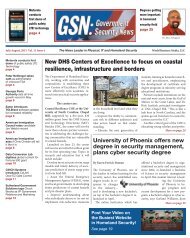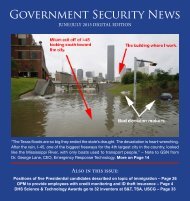GSN January 2016 Digital Edition
Create successful ePaper yourself
Turn your PDF publications into a flip-book with our unique Google optimized e-Paper software.
Access Control<br />
House passes Visa Waiver<br />
program bill that excludes<br />
nationals of Syria, Iraq,<br />
Iran and Sudan<br />
By Joshua Breisblatt<br />
While Congress may be backing<br />
away from targeting the refugee<br />
resettlement program in reaction<br />
to recent terrorist attacks, lawmakers<br />
appear to have found a new<br />
target: the Visa Waiver Program<br />
(VWP). The VWP allows travelers<br />
from certain countries to enter the<br />
United States without obtaining a<br />
visa in advance. Currently, 38 countries,<br />
including France, the United<br />
Kingdom and Taiwan, are part of<br />
this program, with over 20 million<br />
visitors utilizing it each year. It was<br />
created to facilitate more efficient<br />
inbound travel to the U.S. and requires<br />
pre-screening of travelers<br />
who are pre-approved through the<br />
program. In designating a country<br />
to participate, the Department of<br />
Homeland Security, in consultation<br />
with the Secretary of State, considers<br />
only those the U.S. holds “the<br />
best law-enforcement and security<br />
relationships with.”<br />
At the end of November, the<br />
White House announced new security<br />
enhancements for the VWP and<br />
26<br />
a willingness to work with Congress<br />
to make additional improvements.<br />
Tuesday, the House of Representatives<br />
overwhelmingly passed, H.R.<br />
158, the Visa Waiver Improvement<br />
and Terrorist Travel Prevention Act<br />
of 2015 by a vote of 407 to 19. The<br />
text of this bill, like the refugee bill<br />
passed in November, was rushed<br />
to the floor with little review (no<br />
committee markup or hearings<br />
on the legislation). The bill terminates<br />
VWP travel privileges for all<br />
citizens of VWP countries who are<br />
also nationals of Iraq, Syria, Iran, or<br />
Sudan, essentially singling out and<br />
discriminating based on nationality<br />
and national origin. It also excludes<br />
all individuals who have traveled<br />
since March 1, 2011 to certain<br />
countries– including Syria, Iraq and<br />
other designated countries. The bill<br />
also establishes additional reporting<br />
and eligibility requirements for<br />
VWP countries and enhancements<br />
to the Electronic System for Travel<br />
Authorization (ESTA).<br />
Many organizations expressed<br />
concern over the language, saying<br />
it is overbroad and will have unintended<br />
consequences, with one example<br />
being making it potentially<br />
more difficult for journalists and<br />
humanitarian aid workers to travel.<br />
And, according to media reports<br />
the European Union is concerned<br />
as well. David O’Sullivan, the European<br />
Union ambassador to the U.S.,<br />
said visa-waiver members are “really<br />
quite concerned about what is<br />
happening and fear that this could<br />
be extremely counterproductive.”<br />
Despite the criticism, and partly<br />
due to the lopsided vote in the<br />
House Tuesday, there is a great deal<br />
of discussion about including this<br />
bill in the Omnibus spending bill, a<br />
must pass bill that will keep the government<br />
from shutting down. The<br />
current spending bill is set to expire<br />
this Friday, December 11, 2015.<br />
Those discussions, however, are still<br />
ongoing, and for now, the VWP bill<br />
heads over to the Senate, which has<br />
a variety of its own VWP proposals.<br />
In the wake of several recent tragedies,<br />
the rush is on in Congress<br />
to take steps to keep America safe.<br />
Hopefully, in the process, Congress<br />
does not make careless and hurried


